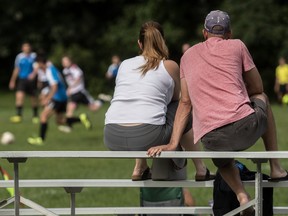Most studies report parents’ levels of physical activity are strong determinants in the activity patterns of their kids.

Reviews and recommendations are unbiased and products are independently selected. Postmedia may earn an affiliate commission from purchases made through links on this page.
As parents, we strive to teach our kids healthy habits that will stay with them for a lifetime. Eating plenty of fruit and vegetables, getting enough sleep and limiting screen time are some of the practices we try to instil in our children. But when it comes to physical activity, not all families spend time being active together, throwing or kicking a ball, skating on the rink or splashing around in a pool.
How much influence do parents have when it comes to raising active kids who turn into active adults?
There’s no disputing parents are important role models when it comes to other lifestyle choices like diet, smoking and drinking alcohol. But what’s not as well understood is the effect parents have on their child’s physical activity. Are fit parents inclined to have fit kids? Or can parents more comfortable reading a book than working up a sweat successfully foster an active lifestyle in their children?
Most studies report parents’ levels of physical activity are strong determinants in the activity pattens of their kids. But it’s not only a case of kids modelling their parents’ lifestyle. Passing the love of physical activity from generation to generation is more nuanced than kids following the lead of their parents. Studies of twins and family members have revealed a genetic link between the fitness of parents and their offspring. And some studies have suggested active mothers play a more important role raising active kids than active fathers. Others suggest fathers have the most influence. There’s also some evidence mothers have more effect on the exercise traits of their daughters, and fathers more sway on the fitness of their sons. But as at least one study suggests, as long as one parent is active, the sex of that parent likely makes little difference to the fitness and sports participation of their children
The waning influence of parents as kids become teenagers isn’t exclusive to exercise behaviour, but it often coincides with a decrease in the number of active youth. Fewer teens register in organized sports and fewer parents cheer them on from the sidelines. This perceived lack of interest from parents may be part of the reason so many young people drop out of sports in their teen years.
But it doesn’t take a lot of time or money for parents to encourage children to be active. Setting limits on screen time and finding affordable and accessible ways for kids to move is doable for all parents, even if they have no intention of setting foot in a gym themselves. Research suggests parents who support their children by joining them in active play, signing them up and bringing them to their activities as well as cheering them on from the stands, are successful at fostering an active lifestyle.
Given the evidence exercise behaviour learned within the family remains relatively stable throughout the life cycle, it’s important not only to put the time in early, but to continue support well into the teen years. Getting kids to put down their phones and tablets, registering and supporting participation in organized sports, encouraging physical literacy in schools (the teaching of basic athletic skills like throwing, kicking and catching) and dedicating a portion of family time to active pursuits, are simple strategies all parents can adopt with proven results.